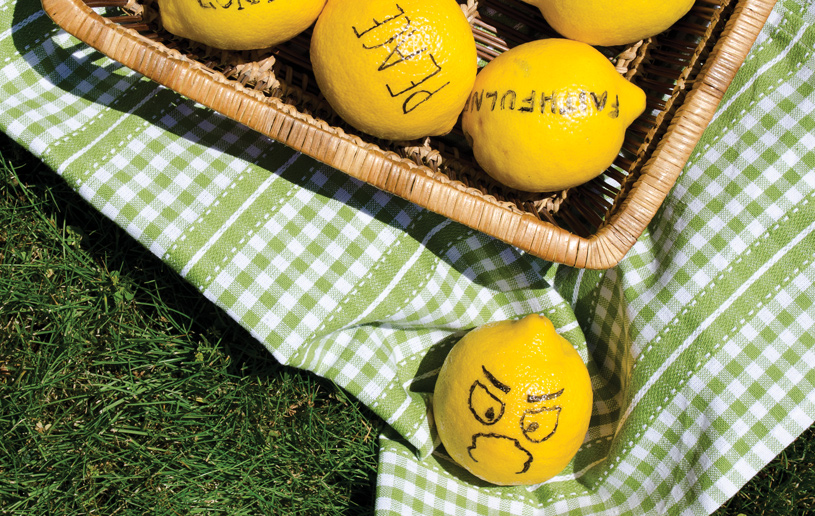
Yesterday a gentleman phoned to tell me he did not like my sense of humour. “What does laughing have to do with being a Christian?” he asked.
“Is that you, Dad?” I replied, joking.
He was not amused. So I got his address and stuffed a potato in his exhaust pipe. Not really. But the thought did occur to me.
My son Jeffrey seems to think laughter is a good idea. His laugh is contagious. One that spills out of his room, down the street, and even into the church. When he was very small, he took to screaming during a sermon, so I whisked him out the back. As I did, he yelled over my shoulder, “Pray for me!” He's been making us laugh ever since.
I am convinced that few weapons are more important in fighting discouragement and difficulty these days than a good sense of humour. Laughter, stress, and worry cannot co-exist for long. Stress inflates our balloons to the popping point; laughter slowly releases the pressure. Laughter is cholesterol free, contains no MSG, no fat, and no negative side effects. Although it got me into a ton of trouble in fifth grade, laughter never committed a crime or started a war, and there is no record of anyone who died laughing. I have seen laughter disarm, revive, motivate, encourage, and cheer. It is the shortest distance between two people, and one of the few things the government does not yet tax.
But laughter is not always easy to come by, is it? Life is difficult. Times are tough. While speaking at a retreat, I noticed one couple sitting in the front row at each of my sessions (speakers don't forget such things). The wife was a brilliant and witty woman who laughed at all of my jokes! But her husband merely glared at me. For three days he did this. His lips were puckered. He looked like he'd been sucking rivets off a skateboard. After the final session, his wife approached me with a smile and an extended hand. “I just want to thank you,” she said. “I haven't seen my husband laugh this hard in years.”
My wife's sister Miriam provides a startling contrast. Miriam suffers from Huntington's disease, a rare genetic disorder causing rapid mental and physical deterioration. Doctors who treat thousands of Huntington's patients are amazed at how slowly this awful disease is growing in her body. The reasons are numerous: a loving husband and family, a positive attitude never ceasing to amaze us, and perhaps most noticeably, an easy laugh. Those who have every reason to cry and yet choose to laugh seem to have a jump-start on life. A doctor told her husband Jim “Miriam's attitude has reduced the symptoms of Huntington's by 50 per cent.”
“It seems your belief in a higher power has helped you,” a psychologist said to Miriam and Jim one day. Miriam smiled. “That would be God,” she said.
Hers is the laughter of one who has discovered the art of Christian living: giving thanks for what we can see and not complaining about what remains in the dark. At the very core, Miriam knows that she is loved by God, held in His arms, and promised the eternal joys of heaven. She has learned that God gives us enough light for the next faltering step, so she rejoices in the little light she's given, not asking for some great spotlight to take all the shadows away.
For Miriam, laughter has plugged the springs of bitterness, put a permanent cork on tension, and soothed the crippling pain of disappointment. She could be pinned to the mat, but instead she pins this magnet to her fridge: “In the world you will have trouble, but be of good cheer, I have overcome the world.” Just below it is another one: “If you can't make me thin, make my friends look fat.”
Children who see such an attitude are changed forever.
As a humourist, it is my privilege to speak to thousands of people each year. Many are Christian groups; some are not. But I've made a surprising discovery lately—Christians laugh harder. I have seen them fall off benches, ask for oxygen, and hyperventilate. Perhaps the world laughs to forget, but Christians laugh because we remember. We remember that the most serious issues were dealt with at the cross. Death was swallowed up. Eternity was promised. Surely the greatest punchline in all of history is this: that a holy God could love the likes of me. This truth bids me live life with thanksgiving. And sometimes you may see me laughing. It is the laughter of one who deserves the worst and is offered the best. It is the laughter of the forgiven.
Speaking of forgiveness, the next time that gentleman calls about my sense of humour I won't put a potato in his exhaust pipe. But I may consider stuffing fiberglass insulation into his pyjamas.

